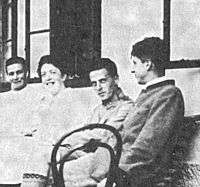Rush Rhees
| Part of a series on |
| Ludwig Wittgenstein |
|---|
 Wittgenstein (second from right), Summer 1920 |
|
Works |
|
Interpreters
|
Rush Rhees (/riːz/; 19 March 1905 – 22 May 1989) was an American philosopher. He is principally known as a student, friend, and literary executor of the philosopher Ludwig Wittgenstein. With G. E. M. Anscombe, he edited Wittgenstein's posthumous Philosophical Investigations (1953), a highly influential work. He was also responsible for publishing other works by Wittgenstein, including Remarks on the Foundations of Mathematics, Philosophische Bemerkungen, Philosophical Remarks, and Philosophical Grammar. Rhees taught at Swansea University from 1940 to 1966.
Early life and studies
Rush Rhees was born in the United States of America on 19 March 1905, at Rochester, New York. He was the son of Benjamin Rush Rhees, a Baptist minister, author and president of the University of Rochester.[1] He studied philosophy at the University of Rochester, but was expelled in 1922 for insolent questions. In 1924 he moved to Britain, where he graduated from the University of Edinburgh in 1928. In 1932 he became a research fellow at the University of Cambridge. There he impressed G. E. Moore who described him as his ablest student,[2] and met Wittgenstein, who became a close friend, and continued to visit him after his move to Swansea in Wales.
Career
Rhees taught philosophy at Swansea University from 1940 to 1966. He has been known mainly as a Wittgenstein exegete and for his influence on his friends, colleague Peter Winch and former student and his literary executor D. Z. Phillips. He was responsible for editing but also developing the legacy left by Wittgenstein, at times emphasising religious and ethical understandings of Wittgenstein's work, reflecting how Wittgenstein himself sometimes said he wanted to be understood. Together with G. H. von Wright and G. E. M. Anscombe he was appointed by Wittgenstein as his literary executor. He was also Wittgenstein's personal executor.
Rhees was also influential in bringing the work of other philosophers to greater attention, notably for example the French philosopher, Simone Weil. For a time, he was visiting Professor at King's College London, and with Winch and Norman Malcolm formed a 'formidable triumvirate'[3] of Wittgensteinans.
Rhees returned to Swansea in 1982 after the death of his wife Jean Henderson, where he continued to teach, leading weekly post-graduate seminars from 1983 and, in the Cambridge tradition, welcoming a few students in 'at home' sessions for more detailed discussions of their research work. He also attended weekly meetings of the University's Philosophical Society he founded (around 1940) and which counted Wittgenstein as chief amongst those eminent philosophers who addressed it in the years when Rhees was a lecturer at Swansea (retiring in 1966). It was also a forum in which students were expected to test and sharpen their philosophical wits. It was clear in these seminars that Rhees was not only devoted to exegesis of one of the finest thinkers of the twentieth century, but was, in fact, constantly absorbed in developing his own profound insights in Philosophy in repeated tours de force. He was self-effacing of his capacities and had to be persuaded to accept an honorary professorship at Swansea where he had previously turned down promotion during his teaching career.
He died on 22 May 1989, and is buried at Oystermouth Cemetery in Mumbles near Swansea.
Major works
- Edited Studies in Logic and Probability (1952), a selection of works by George Boole
- Edited Philosophical Investigations (1953), by Wittgenstein
- Without Answers (1969)
- Wittgenstein and the Possibility of Discourse (1988)
- On Religion and Philosophy (1997)
- Moral Questions (1999)
References
- ↑ Oxford Dictionary of National Biography, Oxford 2004, pp. 588–9
- ↑ see the biographical sketch by D Z Phillips in Rhees' On Religion and Philosophy, 1997
- ↑ Colin Lyas, "Peter Winch", Acumen Press, 1999, p. 4